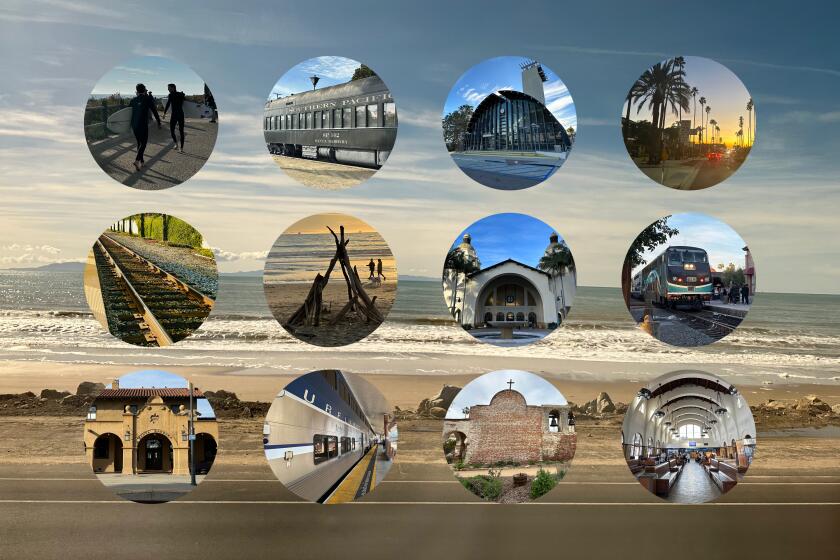Agencies That Know Cruises Are Nearly Letter Perfect
If you’re planning a trip by plane, the odds are good that you’ll buy your tickets through a travel agent. But if you’re thinking of a cruise, the travel agency is a virtual certainty. Because of the way cruise lines market themselves, about 95% of cruise bookings are made through travel agents.
So how do you find the agent who will find you the right cruise?
In some ways, finding the right cruise agent is like locating a good dentist or attorney or mechanic: You look upon advertising with skepticism, ask around among friends and family, and rely on a combination of word of mouth and trial and error.
But it helps to keep some differences in mind too. For instance, because almost all transactions are by phone, fax or mail, your travel agent need not be based in your neighborhood. Also, though the distinctions are little known outside the travel industry, there are credentials that help separate the most experienced agents from the rest of the pack. Some encouraging initials to keep in mind: ACC, MCC and CTC, which I’ll get back to in a moment.
It helps, too, to understand a little of the agents’ side of the business. Industry insiders say there are about 200,000 to 250,000 agents in the U.S.--or 400,000 to 500,000, if you include those who have been enticed by “card mill” agencies that sell credentials to discount-seekers but deliver little or no training.
Typically, travel agents charge consumers nothing or a service fee of less than $25, relying for income on commissions of 10% to 15% from the cruise lines, just as they do from most airlines, hotels and rental-car companies. Thus, the agent who makes a pair of $2,000 bookings on a cruise has probably earned $400 or more, sometimes with just a couple of phone calls and an hour or two of follow-up chores.
This isn’t to say that travel agentry is easy. It isn’t, nor is it particularly well paying; the vast majority of travel agents earn less than $30,000 yearly, and worry, perhaps justifiably, that the airlines are trying to squeeze them out of business by selling directly to the public.
In part because of those worries--and because booking a cruise earns more money in less time than separately booking airline tickets, hotels and rental cars--more and more agents are claiming a specialty in cruises and package tours. Some agencies, in fact, book only cruises--but that doesn’t necessarily make them more adept than a full-service agency.
To get a sense of an agent’s experience, ask her (the vast majority of agents are women) how long she’s been in the business, where she has been herself and how frequently she books cruises. Any experienced agent should be able to explain the very different characters and price ranges of the major cruise lines. Also, keep in mind that using a big agency is no guarantee that the agency can find you better cruise prices or the most appropriate line.
Now, back to those initials. The qualifications of travel agents can vary from years of training to virtually none. But most reputable travel agencies belong to the American Society of Travel Agents (ASTA). (To search for a local ASTA agent online, go to ASTA’s Web site at https://www.astanet.com)
Beyond that, you should also be familiar with the New York-based Cruise Line International Assn. (CLIA). Because most agents who book cruises deal with this trade group, those initials turn up in a lot of places and may not prove much in themselves. But since 1992, CLIA has offered a pair of training programs for agents who sell cruises, and those programs are widely acknowledged among agents as the best evidence on paper of cruise expertise.
To be dubbed an Accredited Cruise Counselor (ACC), an agent must complete various courses in sales strategies and industry practices, inspect at least 10 ships, and take at least two cruises, one lasting more than seven days. To be dubbed a Master Cruise Counselor (MCC), course work increases and shipboard requirements rise to 20 inspections and five cruises, three of them lasting a week or more.
As of mid-August, CLIA officials said they had granted 1,227 MCC certificates and 5,251 ACC certificates nationwide. Another 17,808 agents, a spokeswoman said, have enrolled in at least one course toward accreditation. (To seek MCC- and ACC-accredited agents by area online, go to https://www.ten-io.com/clia/)
Another clue to an agent’s professionalism is the designation Certified Travel Counselor (CTC), which means the agent has five years of experience and has completed about 150 hours of classroom training in a series of courses designed by the Institute of Certified Travel Agents, based in Wellesley, Mass. (The courses, which do not require cruises or shipboard visits, are offered on a rotating schedule around North America.) ICTA President Bob Lepisto estimates that 23,000 agents nationwide have earned CTC designations. (The ICTA is assembling a zip-code-based directory of CTC agents that should soon be available online at https://www.icta.com)
Sign up for The Wild
We’ll help you find the best places to hike, bike and run, as well as the perfect silent spots for meditation and yoga.
You may occasionally receive promotional content from the Los Angeles Times.




